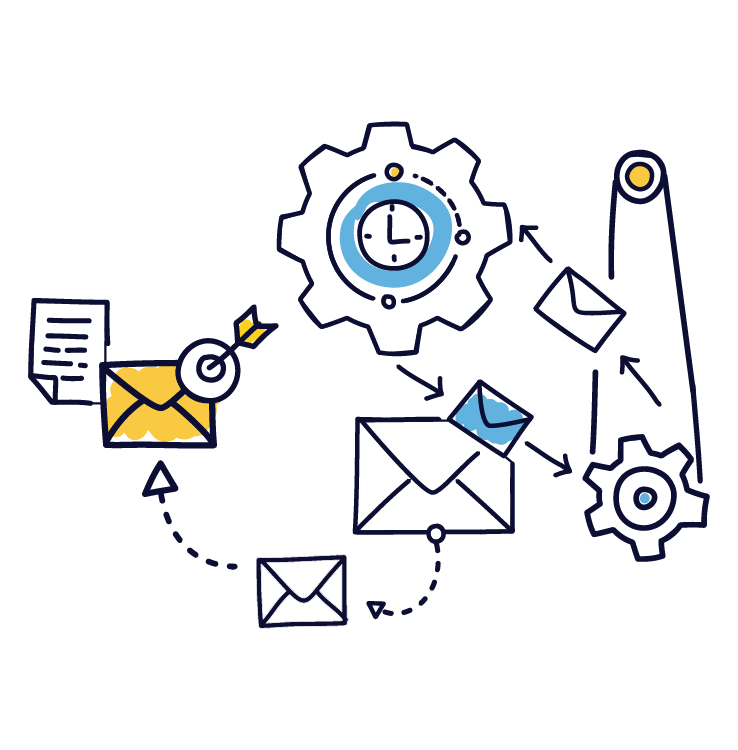
Their tactics might be different—marketers communicate at scale, while salespeople communicate person-to-person—but they’re two links in the same chain. And they can’t work together efficiently unless they’re operating with the same information.
Think of CRM and marketing automation software as two rockets tied together, pointed in opposite directions. As powerful as they are individually, the fact that they’re separate systems holding separate data and piloted by separate teams can cause big problems. No matter how well you use these tools, there’s always going to be a gap where critical information gets lost.
The purpose of growth software is to close that gap and get sales and marketing teams operating as an organized unit.
Growth software is a category of business software that combines sales and marketing features into a unified platform, giving B2B organizations a single tool to nurture leads throughout their entire funnel.
Growth software typically includes email marketing automation, customer relationship management, and pipeline automation tools, allowing growth teams to have a full understanding of their historical relationship with every contact, provide the right attention at every stage of the funnel, and encourage collaboration between sellers and marketers.
The growth software market is currently led by a handful of veteran players including ActiveCampaign and HubSpot. In 2021, Nutshell added email marketing automation to our powerful suite of CRM and sales automation tools, officially moving us into the growth software category. (Learn more about Nutshell Campaigns right here.)
By allowing sales reps, sales managers, and marketers to work out of a single tool, growth software provides a number of advantages. Namely…
The main disadvantage of using separate software tools for marketing and sales is that they each hold different information. Sellers and marketers often don’t know which info is the most current, or what the other department is saying to their prospects.
This “black hole” of information leads to deals and conversations slipping through the cracks, as well as prospects and customers getting irrelevant messaging. (“I just bought a Peloton, so why is Peloton emailing me to see if I want to buy a Peloton?”)
Even the best CRM/email marketing integrations don’t do a flawless job of keeping critical information synced in both places, or communicating the full context of your marketing relationship with a prospect to the sales team. Operating out of a unified growth software tool is the only way to prevent important customer information from falling into the black hole.
Being able to track customers “from source to sale” is the magic bullet for growth teams. If you can trace individual customers back to specific marketing efforts, you can focus your marketing budget on the channels and campaigns that are bringing in the most profitable customers.
Growth software gives you direct insight into how marketing inputs connect to sales outcomes. Which types of marketing messages drive the most sales? What is the revenue impact of your email newsletter or your landing pages? Figuring this stuff out with separate sales and marketing tools requires a ton of research and number-crunching.
Unified growth tools make the attribution process a lot easier, and give you actionable data to increase the efficiency of your entire funnel.
Wouldn’t it be great if you didn’t have to buy a CRM, an email marketing tool, and a sales engagement tool and figure out how to make them all work together?
Every software tool your company uses has different passwords, different admins, and different user experiences, and switching between them steals your focus and takes time out of your day. And while we certainly appreciate the value of software tools playing nicely with each other, wiring these tools together can be a major headache.
Besides, some things shouldn’t even be integrations in the first place. (Imagine your email and calendar being housed in separate tools!) CRM and marketing automation are so interdependent that they should naturally be operated from a single product. You shouldn’t need more than one tool to track a customer going through your funnel.
Sales teams and marketing teams can’t rely on integrations to do their jobs effectively, most of them can’t afford an enterprise product like HubSpot, and they shouldn’t be expected to patch together a handful of tools using APIs or Zapier. Creating a flawless customer experience requires bridging the gap entirely, and making it accessible to all businesses, not just the giants.”
Andy Fowler, Co-founder of Nutshell
We strongly believe that the sales and marketing should be on the same team, in pursuit of the same goal: revenue growth. But when your sellers and marketers are siloed into separate departments with their own software tools, they tend to chase individual metrics that are less impactful.
Maybe your marketing team spends all their time trying to improve their web traffic, open and click rates, and email list size, while your sales team tries to boost their number of meetings booked or average deal size. None of these efforts will move the needle as much as a collaborative focus on the big picture.
Growth software encourages your entire team to work together by providing shared tools, shared data, and a fully transparent view of how marketing and sales efforts influence each other. When marketers see how leads from certain channels are performing down the funnel, they can adjust their strategy accordingly, bringing in more of the kind of leads that will help their sellers (and the company as a whole) be successful.
Related: Curing the tension between sales and marketing: A Q&A with Nutshell Co-Founder Guy Suter
Growth software doesn’t have to do everything, but it should contain the basic tools your sales and marketing teams need to turn prospects into customers. When you’re shopping for growth software, be sure to see how each solution compares on these six important features.
We’ll start with a no-brainer. CRM is the source of truth for your customer relationships, as it holds the contact information and communication history for every buyer and potential buyer that your company has ever interacted with.
Anything you need to know about individual sales contacts—from their geographic location and job title to the last marketing email they opened—should be easily accessible in your growth software’s CRM. And when your customer information is contained in a unified sales and marketing platform, there should be no doubt on whether that info is up to date.
This is the primary tool that marketers rely on to nurture email contacts and turn form-fillers into actual leads. Whether you need to send a weekly marketing newsletter, a one-off product announcement, or a drip series, you should be able to do it out of your growth software, and each email campaign’s replies and performance stats should be viewable to everyone on your growth team.
There’s a lot that annoys us about email marketing software in its current form, but putting it under the same roof as your sales tools solves most of those little aggravations.
There are two ways to run a business that brings in thousands of leads a month: Hire a gigantic sales team, or let technology work in your favor.
One growth software tool that saves sales reps a ton of time is automated personal email sequences, which allow you to build customized one-on-one email drips that trigger when a prospect reaches a certain stage in your pipeline and shut off as soon as the prospect responds.
This ensures that all of your new leads get a “personal” touch from your sellers, while enabling your team to spend more time on high-value activities like phone calls, personal demos, and client meetings.
Plus, having automated email sequences as part of your growth software means you don’t need to bolt on (and pay for!) a separate sales engagement tool like Outreach, Reply, or Mixmax.
Are you falling off your prospects’ radars? With Nutshell’s personal email sequences, we’ll remember the follow-up for you.

While personal email sequences automate your reps’ outreach activity, pipeline automation features automate your company’s sales process, which is just as important. Having the ability to create customized, automated sales pipelines means you can…
With every lead flowing through a standardized process, valuable deals no longer get lost due to disorganization, and your sales manager can focus on leading instead of micro-managing.
I don’t have to ask my team every day, ‘How’s it going?’…I knew the automation would be great, but the surprise that came is how much [Nutshell] is going to help me as a manager, to be a support-based leader.”
Jennifer Acker, Executive Director of Eclectic Music
Email marketing software may help your team communicate with existing contacts, but where do those contacts come from in the first place? In an inbound selling model, building your list of subscribers and potential buyers depends on directing web traffic to relevant landing pages and convincing those visitors to submit their contact info through embedded forms.
Today, marketers typically rely on third-party landing page platforms like Unbounce to create and manage those pages. (And if they’re really slick, they’ll integrate their landing page software with their CRM to track customers from source to sale.)
However, the visitor-to-signup flow is so critical to a modern marketing operation that landing page and website CMS tools should logically be a part of your growth software suite, as this would eliminate one more potential area for lead information to get lost.
These features might not be standard-issue for growth software yet, but we think that’s where the category is headed.
Growth software platforms contain a broad range of features that can be overwhelming for teams who are coming over from spreadsheets, or who have been using their invoicing software as their customer database.
There will be times using these platforms when you just want to ask another human being, “Can you help me figure this out?” That’s why free access to a live support team is just as important as any technical feature. (Pro tip: If a software company tries to charge you extra for the privilege of technical support, they don’t deserve your business.)
Do you think growth software would help your team grow? Start a free 14-day trial of our award-winning sales and marketing platform and find out why Nutshell customers love, love, love us!
No problem. To see if Nutshell is the right choice for your sales team, start a 14-day free trial today!


Join 30,000+ other sales and marketing professionals. Subscribe to our Sell to Win newsletter!